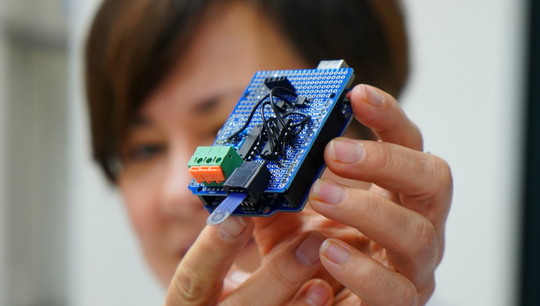New System Developed to Determine Viral or Bacterial Diseases
Chemists from the Urals have created a portable diagnostic platform for the express diagnosis of viral and bacterial diseases, as well as for determining the level of certain antibiotics. The development is based on unique molecules created by specialists from the Ural Federal University and the Postovsky Institute of Organic Synthesis of the Ural Branch of the Russian Academy of Sciences. The scientists suggest that the new device will be less expensive than its counterparts on the market due to the use of inexpensive components and a chemical, rather than biological, basis. The chemical base has a shelf life of at least one year (although the scientists have not tested it for longer), its synthesis is less expensive, and the results are more reliable.
“The scientific team, in collaboration with an industrial partner, has developed a portable diagnostic platform for rapid identification of the type of infectious disease pathogen (viral or bacterial) and certain antibiotics, including chloramphenicol. This device enables medical staff to make an initial diagnosis quickly, saving patients from undergoing unnecessary tests. The development’s peculiarity lies in its chemical basis. The original organic molecules can selectively interact with viral proteins and some antibiotics. This principle of action provides the device with high stability and is unique, as there are no similar devices in the world,” explains Alisa Kozitsina, co-author of the development and director of the Research, Education, and Innovation Center for Chemical and Pharmaceutical Technologies of UrFU.
Scientists report that it is possible to determine within five minutes whether a person is sick and whether the disease is viral or bacterial by making a swab in the nasopharynx, placing it in a solution, and dropping it onto a sensor. The result will be displayed on a computer monitor.
“Today’s diagnostic systems, such as those used to detect COVID-19 or influenza in the body, have limited sensitivity and stability. These systems rely on biological substances, such as antibodies, antigens, and proteins, which have a limited lifespan and require specific conditions for analysis and storage. Our goal is to develop a more reliable and sensitive product that does not rely on biological components, but instead utilizes the most stable chemical reagents available,” comments Alisa Kozitsina.
The device is made using materials sourced from Russia. According to the developers, this choice ensures production stability that is not affected by geopolitical factors. Additionally, the cost of development is expected to be lower than that of similar products currently available on the market.
“Our device utilizes cost-effective Russian-made electronics that are readily available in warehouses. Additionally, the synthesis of chemical molecules is more economical than producing biological components, which will enhance the competitiveness of our development,” explains Alisa Kozitsina.
The portable platform is expected to be beneficial for doctors and patients alike. It will aid in selecting appropriate therapies and avoiding unnecessary antibiotic prescriptions.
Currently, the development has been tested and an agreement with an industrial partner has been signed. Experts anticipate the first sample for industrial production to be available in the fall of this year.

